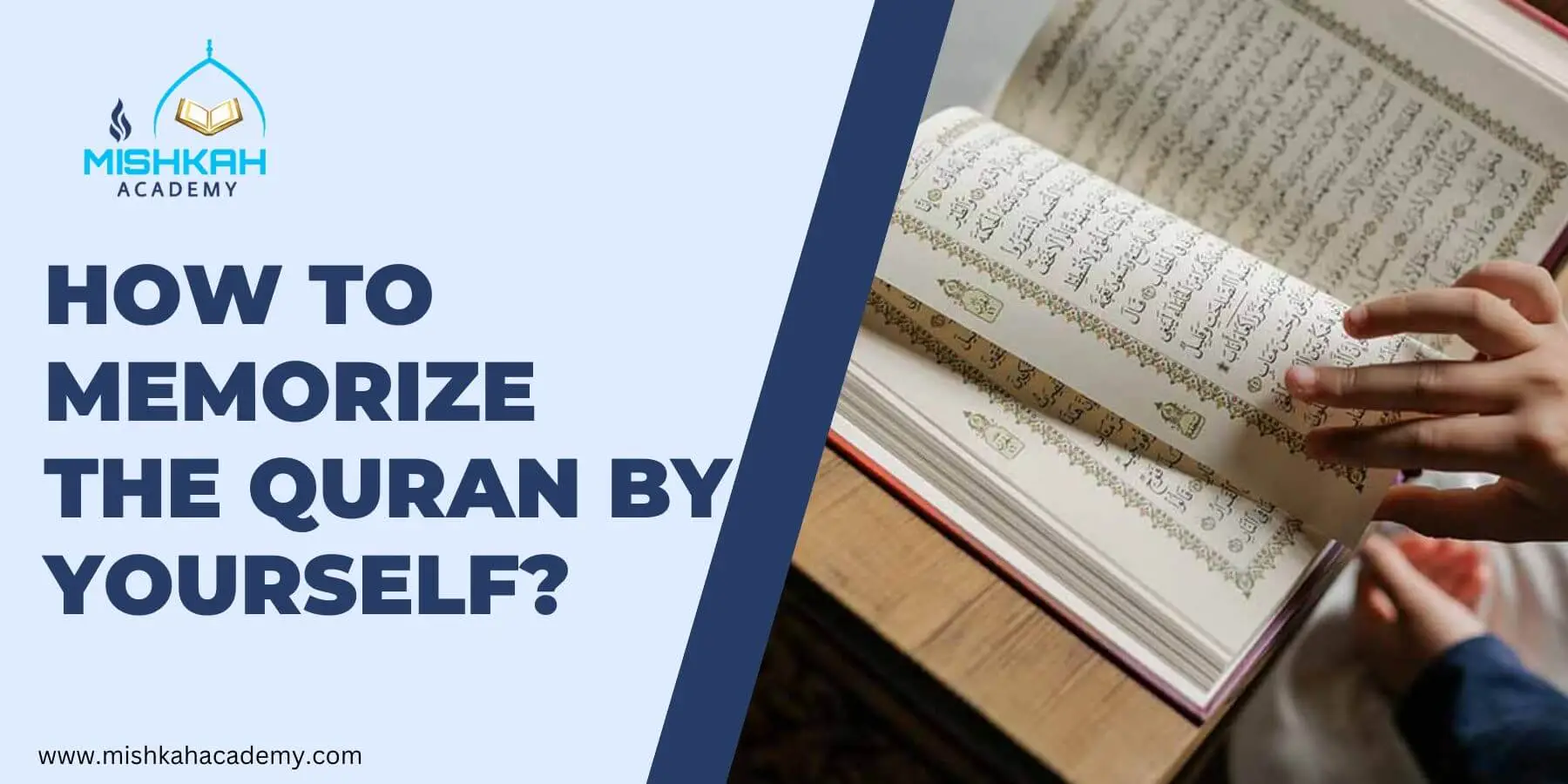Memorizing the Quran all by yourself is a great task. Usually, Muslims trying to learn the Quran opt for Quran tutors or someone in their family to help them start this amazing journey. However, one needs a thoroughly structured set of guidelines and tips to help them Hifz the entire Quran on their own. And today, we will help them provide exactly that.
When memorizing the Quran on your own, the best way to begin is by setting strong basics via Noorani Qaida. Then, create a structured and customized Quran memorization schedule that aligns with your daily routine. Begin memorizing with short surahs, choose and stick with a dedicated Quran memorization technique, listen to recitations on repeat, and stay consistent with quran memorization program.
Can You Memorize the Quran by Yourself?
Table of Contents
ToggleYes, you can memorize the Quran by yourself, and many people around the world have done so. However, it’s a challenging task that requires dedication, patience, and a structured plan. While it’s possible to memorize alone, getting guidance from a Qari (Quran teacher) can be very helpful in correcting mistakes and ensuring proper pronunciation. This is especially important for younger learners, who might struggle without proper guidance.
Many adults, though, have successfully memorized the Quran independently later in life, using strategies like daily memorization goals and regular revision. With the right approach and commitment, memorizing the Quran on your own is achievable.
10 Practical Ways to Memorize the Quran by Yourself
Here are best practical ways shared by MIshkah Academy hifz teachers to students to memorize quran by themselves.
1. Set Strong Basics with the Help of Noorani Qaida
Before starting to memorize the Quran, it’s important to learn the basics, and Noorani Qaida is perfect for this. It helps you understand how to read the Quran properly, with a focus on the right pronunciation and Tajweed rules. You’ll also learn how to pronounce the Arabic letters correctly, which is very important when memorizing.
Many teachers use Noorani Qaida to teach students the foundation of reading the Quran. It guides you on where to stop, how to start again, and more. Having strong basics makes memorizing the Quran easier, and Noorani Qaida ensures you get it right from the beginning.
2. Create a Structured and Easy Quran Memorization Schedule
Having a clear schedule is a key part of memorizing the Quran. It keeps you focused and helps you stay on track. Your schedule should be easy to follow and not too overwhelming. Start with small parts each day and gradually increase. Consistency is crucial, especially when following an online hifz course, as it provides the structure needed to stay committed. Here are things to consider when making your schedule:
- How many hours to study each day
- How many Ayahs to memorize at once
- How many days a week to practice
- Include time for revision
- Adjust the plan if needed to avoid stress
3. Start Your Memorization with Surahs from Juz Amma
When beginning to memorize the Quran, it’s good to start with shorter Surahs. These are found in Juz Amma, the last part of the Quran. They are easier to learn and help you build confidence. Some of the short Surahs to begin with include:
These are short and simple to memorize. Starting with these Surahs will help you get used to the process and make memorizing larger parts of the Quran easier later.
4. Choose from the Best Quran Memorization Techniques
There are many ways to memorize the Quran, and you can choose the one that works best for you. Here are some popular hifz techniques:
- Old Ottoman Technique of Stalking
- The 3:10 Hifdh Technique
- Whole-Page Technique
- Bottom-to-Top Technique
- Use a 3×3 Quran Memorization Technique
These methods help you stay organized and make memorizing easier. Pick the one that fits your study style.
5. Listen to Recitations of Ayahs and Surahs You’re Memorizing
Listening to recitations of the Quran helps you memorize faster. It trains your ears to hear the correct pronunciation and Tajweed. When you hear the Surahs again and again, they stay in your mind. Try to listen while following along with the text. This will help you remember the words and how they sound. It’s also a great way to stay focused and feel connected to what you’re memorizing. This method is good to memorize quran surah fast by yourself.
Book Free Trial Class Now6. Read Aloud When Trying to Memorize
Reading aloud helps your brain remember better. When you say the Ayahs out loud, you hear yourself, and that strengthens your memory. It also helps you focus on the correct pronunciation of each word. Reading aloud while memorizing gives your brain extra practice and makes the words feel more familiar. This way, it’s easier to remember what you’ve learned.
7. Stay Within Your Daily Memorization Limit for Balance
It’s important not to memorize too much in one day. This can make your brain feel tired and overwhelmed. Stick to a daily limit that feels comfortable and allows you to focus. For example, if you want to memorize 10 ayahs per day, that’s fine in the beginning. Do not try to memorize 20 or 30 the next day. Build a run-rate first that your mind gets accustomed to first.
Doing too much can make it harder to remember later. Keep your memorization sessions balanced and take breaks if needed. This way, your mind stays fresh, and you can memorize with better focus and patience.
8. Practice Reciting the Memorized Ayahs in Salah
One of the best ways to strengthen your memorization is to recite the Ayahs you’ve learned during Salah (prayer). This will help you repeat what you’ve memorized, making it stick better in your mind.
When you recite in Salah, your focus increases, and you remember the Ayahs with more attention. This daily practice also helps you improve your recitation, and over time, it becomes easier to recall the Ayahs whenever needed. This practice is good for memorizing quran without forgetting.
9. Sit in a Quiet, Peaceful, and Distraction-Free Place to Memorize
It’s important to find a calm place to memorize the Quran. Noise and distractions can make it hard for your mind to focus. Sitting in a quiet room helps you concentrate only on the words you’re memorizing.
This peaceful environment allows your brain to fully absorb what you’re reading without interruptions. When there are no distractions, you can memorize faster and more easily.
10. Test Your Knowledge by Reciting the Memorized Portion to Others
Reciting to others helps you check if you remember the Ayahs correctly. It’s also a way to make sure you’re pronouncing everything the right way.
The Prophet Muhammad (peace be upon him) said,
“The best of you are those who learn the Quran and teach it.” (Sahih al-Bukhari, 5027).
When you share what you’ve learned, you help yourself and others grow in their Quran learning.
Conclusion
Memorizing the Quran by yourself is possible with dedication and a structured approach. Starting with basics, creating a solid schedule, and using effective techniques are key. Listening to recitations, reading aloud, and practicing in Salah enhance your learning.
However, while self-memorization is valuable, having expert guidance can make a significant difference. Mishkah Academy offers experienced Quranic tutors who provide essential support and correction. Their expertise ensures a smoother and more accurate memorization journey.
Book Free Trial Class Now





